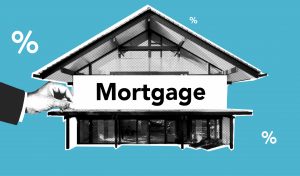
The No-Cost Thirty Year Fixed Rate Mortgage
There really is no such thing as a no-cost mortgage loan. There are always costs, such as appraisal fees, escrow fees, title insurance fees, document fees, processing fees, flood certification fees, recording fees, notary fees, tax service fees, wire fees, and so on, depending on whether the loan is a purchase or a refinance. The term “no-cost” actually means that your lender is paying the costs of the loan. All a no-cost loan means is that there is no cost to you, the borrower.
Except that you pay a higher interest rate.
Understand How Loans Are Priced
A variation of the no-cost loan is the “no points” loan, or even the “no points, no lender fees” loan. On these loans you pay all the costs associated with buying a house or refinancing, but you do not have to pay the lender associated fees or points. However, since lenders and loan officers do not do anything for free, the profit has to come from somewhere.
So where does it come from?
First, you have to understand how loans are priced and how mortgage lenders and loan officers earn income. Each morning mortgage companies create rate sheets for loan officers. The rates usually change slightly from day to day. In volatile markets they change several times a day. On the rate sheet, there are many different programs, including the thirty year fixed rate.
There will be one column that lists several different interest rates and another column that lists the cost for that particular rate. For example:
| Rate | Cost (points) |
|---|---|
| 6.250% | 2.000 |
| 6.375% | 1.500 |
| 6.500% | 1.000 |
| 6.625% | 0.500 |
| 6.750% | 0.000 |
| 6.875% | (0.500) |
| 7.000% | (1.000) |
| 7.125% | (1.500) |
| 7.250% | (2.000) |
In the above example, 6.75% has a “par” price, which means it has a zero cost. The lower in rate you go, the higher the cost, or points. A point is equal to one percent of the loan amount. The parentheses in the cost column for the higher interest rates indicate a negative number. For example, (1.500) equals -1.500, which means instead of having a cost associated with the loan, the lender is willing to pay out money for those interest rates. This is called premium or rebate pricing.
Zero Cost Loans
How Mortgage Companies and Loan Officers Make Money
The above rate sheet is not a rate sheet designed for public review. In fact, most lenders have a policy that the public cannot see their internal rate sheet. This rate sheet is designed for loan officers and the cost column is the loan officer’s cost, not the cost to the borrower. When the loan officer gives you an interest rate quote, he will add on a certain amount, usually one to one and a half points. Most companies leave it up to the loan officer’s discretion how much to add on to the base cost. However, they usually require at least a minimum add-on, which is usually one point.
The loan officer’s commission depends on his split with the company, which varies. He receives a portion of the add-on and the rest goes to the company.
If we assume the loan officer is adding on one point, and you were willing to pay one point for your loan, then your rate would be (according to this rate sheet) 6.75%. You would pay one percentage point and receive an interest rate of six and three-quarters. If you wanted a lower rate and were willing to pay two points, you could get 6.5%. If you wanted a “no points” loan, then your rate would be 7%. The loan officer and the mortgage company would split the one point rebate, listed as (1.000) on the rate sheet.
See how it works?
In addition to the cost noted on the rate sheet above, lenders have certain other fees they collect, too. These can include document fees, processing fees, underwriting fees, warehouse fees, flood certification fees, wire transfer fees, tax service fees, and so on. Usually, you will not be charged all of these fees, it is just that different lenders call them different things. Some of them are legitimate costs to the lender and some of them are simply fees designed to generate additional income to the mortgage company. They are customary in today’s mortgage market and can vary from around $600 to $1,300. In addition, there will usually be an appraisal fee and a credit report fee. Appraisals and credit reports are usually contracted out to independent companies even though these are considered to be lender fees.
Note that it is common for companies who charge higher fees to have a slightly lower interest rate and companies that charge lower fees will usually have a slightly higher interest rate. So if you shop entirely based on fees, you may actually spend more money in the long run because your interest rate may be higher.
The point is that if you want a “no points - no lender fees” loan, then on our rate sheet above, you may get an interest rate of 7.125%. That is because the loan officer has to bump the interest rate even further than on a “no points” loan in order to cover his own company’s fees.
If you want a “no cost” loan, then the loan officer has to bump your interest rate even further. That is because all of the costs on your purchase or refinance do not come from the lender. The escrow or settlement company involved in your transaction will charge a fee that must be paid. The lender will require title insurance and the title insurance company charges a fee for providing this insurance. If your new lender requires information from your homeowner’s association (if you have one) then the homeowner’s association will most likely charge a fee for providing those documents. If you are refinancing, your current lender will usually charge at least two fees: a demand fee, and a reconveyance fee. The demand fee is charged simply for providing payoff information. The reconveyance fee is charged because your current lender prepares a document that releases your property as collateral for their outstanding loan. This document is called a reconveyance.
These charges will add about one additional point to how much the loan officer must collect in premium pricing in order to cover the costs associated with your refinance or purchase. For a zero cost loan, he will normally need to collect somewhere in the neighborhood of two and a half points. Because points are a percentage of your loan amount and most of the costs are fixed, it takes fewer points to provide zero costs on higher loan amounts. On smaller loan amounts it takes more. One percent of $200,000 is $2,000 and one percent of $100,000 is only $1,000, so you can see how it is easier to cover costs on larger loans.
Does it make sense to do a zero cost loan?
On a $200,000 thirty year fixed rate loan, the difference in monthly mortgage payments will be about $87, using the example rate sheet on the first page. Over thirty years, it works out that you will pay more than $30,000 extra for getting a zero cost loan. So if you intend to remain in the home for a long period of time it just doesn’t make sense.
Suppose you intend to stay for only five years. On a purchase, using the $200,000 example, if you stayed longer than fifty-five months, it would make more sense to pay your own costs and get the lower interest rate. If you kept the loan for a shorter time, then it makes more sense to pay zero costs and get a higher interest rate.
Except for one thing.
If you knew you were only going to be staying in the home for five years you would probably not want a thirty-year fixed rate, anyway. You would get a loan that has a fixed payment for the first five years, then convert to an adjustable rate or whatever fixed rates are five years from now. These loans have an interest rate almost a half percent lower than thirty year fixed rate loans. Since it is practically impossible to do a zero cost loan on this type of loan, you would have to compare a zero cost thirty year fixed rate loan to paying points on a loan with a fixed payment for five years.
The difference in payments would be about $150. The two and a half point rebate equals $5,000. Working out the math, if you stayed in the home longer than thirty-three months, it would make more sense to pay the points and get the loan with the five-year fixed rate.
Finally, carry the discussion one step further. Suppose you know you are going to be in the new loan for less than three years? Doesn’t it make sense to get a “zero cost” loan then?
No.
Then you get an adjustable rate loan. As long as the start rate is two percent lower than the current fixed rate, you cannot lose. The first year you will save a lot of money. The second year you will probably break even. The third year, you will probably give up some of the savings from the first year, but not all of it.
Zero cost loans just don’t make sense for most homebuyers.
But they sound really good in an advertisement!
Exceptions:
- On a FHA Streamline Refinance Without an Appraisal (not a purchase - which is what the article talks about), it makes sense to do a zero cost loan. This is mostly because the new loan has to be exactly the same amount as the existing balance of the current loan.
- If the homebuyer only has enough money for a down payment and none to cover closing costs, PLUS no arrangement can be made for the seller to pay closing costs, then zero cost may make sense. (However, I would still recommend negotiating terms with the seller - be willing to pay a higher price in exchange for the seller paying your costs.)












































